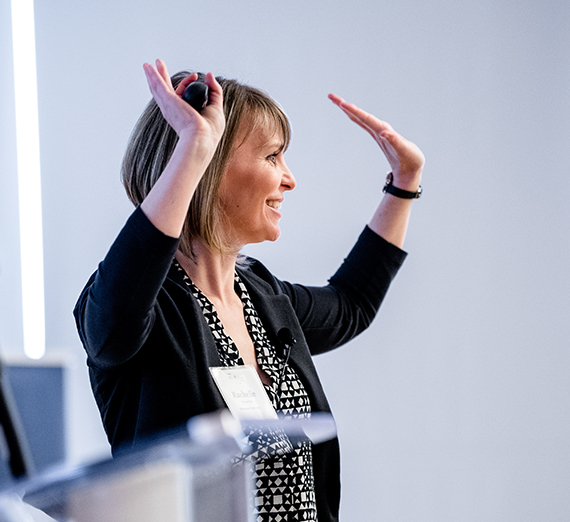Building Allies & Bridging Divides through Women's Leadership

Editor's Note: This story originally appeared in the Spokane Journal of Business, September 2020; republished with permission.
When Julie Kelsey started her 18-year financial career at Merrill Lynch, she was surrounded by men who were reluctant to do things differently. “When I tried to push back, I felt like a fish trying to swim upstream,” she said. “The message I got was that I needed to be more like them if I wanted to succeed.”
Now, as the instructor of Gonzaga University’s 14-week Certificate in Women’s Leadership, Julie is committed to creating a safe environment in which students are empowered to embrace their authentic leadership styles, share the obstacles they face, and help each other overcome them.
The two males who participated in the certificate program last year were struck by how much they did not know about gender-based barriers.
“The female students often described very difficult situations that I had never been in,” said Mike Gribner, Regional Administrator of the Washington State Department of Transportation – Eastern Region. “I got this feeling of looking in on something deeply personal. I learned a lot by simply listening.”
“So many women from different industries faced the same challenges,” said Josh DiLuciano, Director of Electrical Engineering at Avista Utilities. “That’s not a coincidence, and those things didn’t happen in isolation.”
Just as Gribner and DiLuciano learned from listening to the women, the women also sought to learn from them. “They were a sounding board,” said Petra Atilano, Vice President of Credit for Northwest Farm Credit Services. “You could have these open, honest conversations with males who were not in authoritative roles. It was like an insider’s look into the male perspective.”
For Atilano, a first-generation Latina-American, the course gave her a platform to discuss how her upbringing impacted her leadership approach. “I was raised in a culture in which it was not acceptable for women to be in leadership roles. It’s important that leaders understand the culture that women of color come from,” she said, noting gratitude for male mentors in her organization who had encouraged her to speak up and find her voice.
Tomeka Long, a Supply Chain Operations Senior Manager for the Boeing Company and African-American woman, opened up to the group about the challenges of being an ‘only’. “When you walk into a meeting, and you’re the only female and only black person there, you immediately withdraw because you’re the minority in a room of white males. Even when you do speak up, you’re often overlooked.”
These are not the only challenges that Long has faced as a woman of color. Throughout her career, she discovered that having braids or wearing her hair naturally would be perceived by some as ‘unprofessional.’ She also observed that people would sometimes discredit people of color if they used slang or phrases attributed to black culture. “There are subtle hints that whites often don’t realize, little things that only people of color notice because they are so used to it.”
During the certificate, Long experienced an epiphany. When the class was asked to list the mentors and sponsors in their network, she realized that she did not have any white males in that category. She shared with the class that she had not pursued such mentors at Boeing because she didn’t connect with white men, and didn’t think she needed them to succeed. At that point, one of the male students suggested that Long re-consider her approach.
“He said, ‘If white males are the majority and they have more power, wouldn’t you want one of them advocating for you?’ That’s when I realized I needed to stop letting preconceived judgments block me.” Shortly after, Long set up a meeting with one of her directors – a white male – and asked him to advocate for her so that she could get to the next level in her field. He enthusiastically agreed.
“Since then,” said Long, “I have had more and more people knocking on my door giving me opportunities.”
From educating men about professional challenges women face to making whites more aware of obstacles specific to people of color, the certificate highlights the importance of being an ally to those with less power.
“I didn’t think much about allyship until this past year,” admitted DiLuciano, “but now I’m much more intentional about how I advocate for folks.”
Added Gribner, “You can’t advocate for people if you don’t understand the issues. Learn about their battles and what they’re trying to accomplish.”
Working in a male-dominated industry, Long is committed to being an ally to other women who are trying to advance. “I’m sharing with women what has helped me so that women in my industry can be elevated to the same level as men.”
For Kelsey, this is exactly what she was hoping would come from a diverse cohort in the certificate course. “The whole reason we have different types of people at the table is to understand different perspectives,” she said. “The more we can help each other, the better we all will be.”
